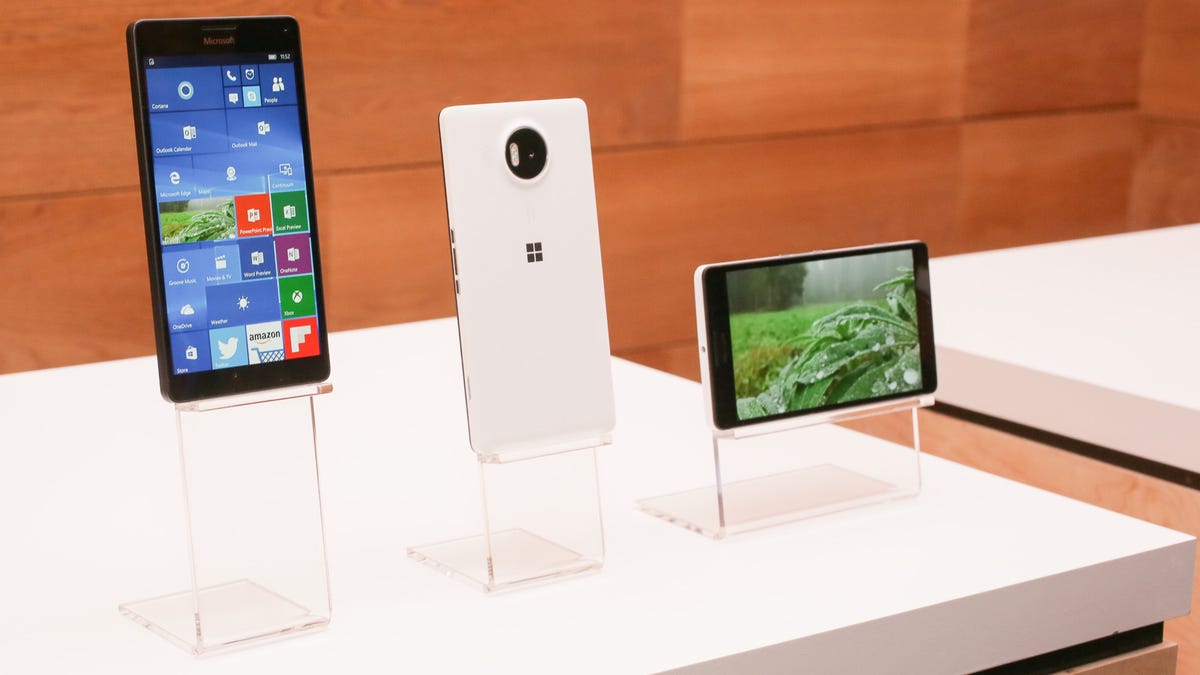Microsoft's new Windows phones: They'll have to do for now
Analysis: A pair of newly unveiled Lumia phones are Microsoft's flagship mobile devices, but they're not the marquee products Windows fans have been waiting for.
Even Microsoft can't decide whether Windows is relevant in the smartphone world.
Since its Windows Phone mobile operating system launched in 2010, Microsoft has pinned its hopes on devices running the software. Just wait until Windows Phone 7, the company said years back in regards to its mobile ambitions. Windows Phone 8 was the next supposed savior of Microsoft's smartphones, followed by Windows Phone 8.1. Microsoft skipped right over Windows 9 altogether.
With Windows 10, however, a curious thing happened to Microsoft's flagship mobile devices: They ended up as an afterthought. During a New York event Tuesday, Microsoft's new Lumia 950 and Lumia 950 XL smartphones with Windows 10 Mobile were overshadowed by the Surface Pro 4 tablet and the surprise Surface Book laptop.
The lower profile of the phones, which Microsoft introduced along with a grab bag of other products, suggests the company isn't pretending that the Lumia 950 and 950 XL will make or break its mobile ambitions. Instead, Redmond, Washington-based Microsoft may be taking its time to create a device different enough -- perhaps the rumored Surface smartphone -- to break the spell Apple's iPhone and Google's Android devices cast on consumers.
"The phones are better," Patrick Moorhead, a consultant for Moor Insights & Strategy said of the Lumia devices. "But they're not going to move the needle for consumers."
No surprise there. Almost no one thinks of Windows Phone OS when buying a device. The operating system has less than 3 percent of the global smartphone market, according to IDC. By contrast, Android has nearly 83 percent and Apple's iOS almost 14 percent of the market.
For its part, Microsoft believes the strong early adoption of Windows 10 will drive interest in mobile. "Windows 10 has a lot of momentum," Tulla Rytila, who runs devices marketing at Microsoft, said in an interview. Windows 10 has been installed on 110 million devices since its July release, according to Microsoft.
Just wait until the next flagship
In July, Microsoft put Panos Panay, the man responsible for the Surface tablet, in charge of its premium products, including the smartphone business. His appointment spurred a guessing game as to when Microsoft might extend the Surface line to phones.
Panay subtly fanned that speculation at the New York event when he distanced himself from the new Lumias, saying he admired the team that created the devices but hadn't been part of it for long.
Rytila declined to comment on the prospect of a Surface smartphone.
Not the killer app
One of the most impressive aspects of the new Lumia devices is their ability to work in Microsoft's most familiar environment: the desktop.
Using phones as the brains of a computer isn't new. Motorola attempted to do the same with its Android-powered Atrix smartphone four years ago, but it was a slow and disappointing experience.
Microsoft appears to have gotten this right, and some enthusiasts at the New York event oohed and ahhed over the function. But it's unclear whether consumers, who have invested in their apps and music collections stored on their iPhones and Android devices, will be interested enough to give the phones a second look.
"While we were impressed with the Lumia 950's ability to turn into a PC, we have a very difficult time envisaging this becoming a killer app," Cowen & Co. analyst Gregg Moskowitz said.
Microsoft is trying to address the weakness of the apps available for its phones. The company has said it's getting more support from developers thanks to universal apps, programs written for the PC that also work on its smartphones.
Still, analysts caution that it will take time for Microsoft to build a decent mobile app store, perhaps as much time as it will take to build a Surface smartphone.


